☆ PuniPuni Youtube ☆
Japanese Grammar – Express Hearsay using 〜そうです – Review Notes
Today, we will learn another use of 〜そうです (~sou desu). After today’s lesson, you will be able to say “I heard~” in Japanese.
………………………………………………………………………………..

★ In a previous lesson, we learned how to make inferences based on direct observation using 〜そうです (~sou desu). If you missed that lesson, click here.
★ Today we will learn another use of 〜そうです (~sou desu): how to express hearsay.

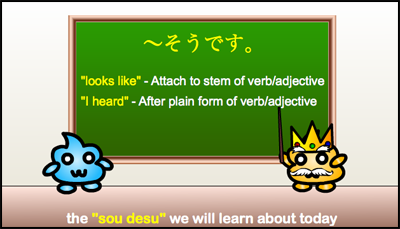
★ The 〜そうです (~sou desu) that we learned in the previous grammar lesson that means “looks like” or “seems” is attached to the stem of the verb/adjective. If you don’t remember this, click here!
★ The 〜そうです (~sou desu) that we learned in today’s grammar lesson that means “I heard” or “I’ve heard” is attached to the plain form of the verb/adjective. If you don’t know what the plain form is, click here!
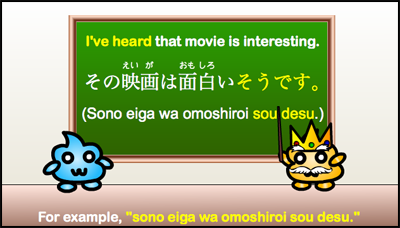
★ その映画は面白いそうです。(sono eiga wa omoshiroi sou desu)– “I’ve heard that movie is interesting”.
★ 面白い (omoshiroi) is an i-adjective in the plain form. It means “interesting” or “funny”
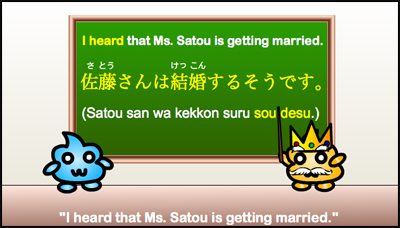
★ 佐藤さんは結婚するそうです。(Satou san wa kekkon suru sou desu.) – “I heard that Ms. Satou is getting married.”
★ 結婚する (kekkon suru) is a verb in the plain form. It means “get married”
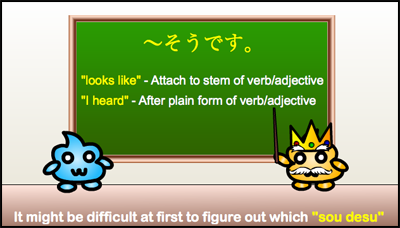
★ Sometimes it might be difficult to tell the difference between the two types of 〜そうです (sou desu) because they sound similar.
★ Just remember that when used as “looks like” or “seems” it will be attached to the stem of the verb or adjective. If you don’t know how to find the stem, review the previous lesson.
★ When used as “I heard~” it will be attached to the plain form of the verb or adjective. If you don’t know what the plain form is, check out this lesson.
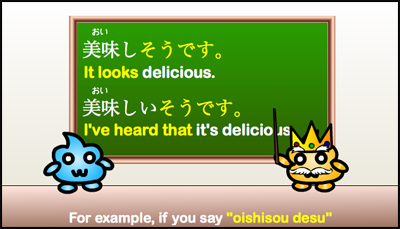
★ Check out this example. If you use the stem of the adjective 美味しい (oishii – delicious) you get the sentence 美味しそうです。(oishisou desu) – “It looks delicious.”
★ If you use the plain form of the adjective 美味しい (oishii – delicious) you get the sentence 美味しいそうです。(oishii sou desu) – “I’ve heard that it’s delicious.”
★ They sound very similar, but the meaning can be pretty different, so be careful!
………………………………………………………………………………..
Additional Information:
……………………………………………………………………………….
★ Today’s grammar can also be used with nouns. Japanese nouns have the same plain form as na-adjectives. Just add だ (da) after the noun. For example:
明日は雨だそうです。
Ashita wa ame da sou desu.
I heard that it will rain tomorrow.
(literally, “I heard that tomorrow is rain”)
★ Note: Although we use the verb “to rain” or the adjective “rainy” in English, in Japanese they use the noun 雨 (ame).
………………………………………………………………………………..
More Example Sentences:
……………………………………………………………………………….
お兄さんは明日帰ってくるそうです。
Onii-san wa ashita kaette kuru sou desu.
I heard that big brother is coming home tomorrow.
……………………………………………………………………………….
その仕事は大変だそうです。
Sono shigoto wa taihen da sou desu.
I heard that job is hard.
……………………………………………………………………………….
彼はいい先生だそうです。
Kare wa ii sensei da sou desu.
I’ve heard that he is a good teacher.
……………………………………………………………………………….
Conclusion:
That’s it for today’s Japanese grammar lesson! If you have any questions, please leave a comment below!
……………………………………………………………………………….
Do you want a Japanese tutor?
Take Japanese Skype Lessons with Professional Japanese Teachers on kakehashijapan.com!
………………………………………………………………………………..
………………………………………………………………………………..









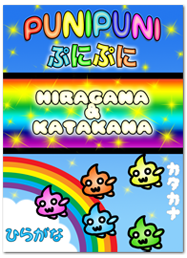
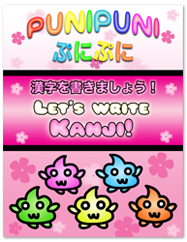


0 comments